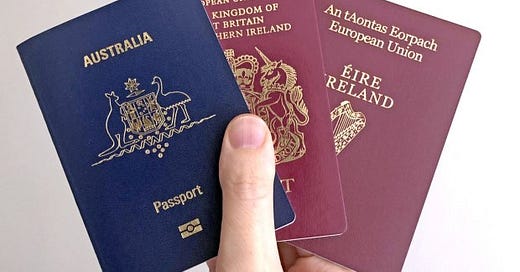Citizenship is more than a bureaucratic label. It’s a legal status that defines your relationship with a country. It comes with rights and responsibilities. It means you belong. You're one of us.
It means when Australia’s playing on home turf, you cheer for the green and gold.
It means that if Australia ever goes to war, you don’t pause to weigh your options. You know which side you’re on.
That’s the essence of citizenship. One nation. One loyalty. Which is why dual citizenship—by its very nature—is a contradiction.
And yet, in one of those enduring John Howard toxic gifts that keeps on giving, dual citizenship became legal in 2002. Before then, if you voluntarily took on another nationality, you automatically lost your Australian one. Simple. Clear.
But then came April 4, 2002. The government repealed that law, claiming it was out of step with a "globalised world." Up to 700 Australians were losing citizenship each year. The fix? Just let them keep both.
According to then-Immigration Minister Philip Ruddock, pressure came from people wanting to reclaim British citizenship so they could travel more freely around Europe.
Boo hoo.
So what changed?
Australians were living, working, marrying overseas. The old laws were called unfair and outdated.
Migrants wanted to keep ties to their birth countries while becoming Australian.
Children born abroad to Aussie parents could have dual citizenship—so why not naturalized citizens?
And of course, staying connected to "global Australians" was apparently good for diplomacy and business.
All of it sounds practical. Even nice. But here’s the thing: citizenship isn't supposed to be convenient. It's supposed to mean something.
Today, citizenship is handed out like candy. You can get most of the benefits, NDIS, welfare, healthcare, without ever becoming a citizen. You don’t even have to pay tax. The only real downside? If you’re a criminal, you might be deported.
Compare that to Switzerland, a country that treats citizenship like the privilege it is:
10 years of lawful residence.
Demonstrated integration into society.
Fluency in a national language.
No recent reliance on welfare.
Yes, the Swiss allow dual citizenship, but at least they make people earn their citizenship.
What does it take to get citizenship in Australia?
2 years of residency.
A pulse.
Passing some hokey exam which includes questions about cricket.
Dual citizenship may sound lovely, celebrated as a symbol of multiculturalism and mobility. But it’s a challenge to national cohesion, to security, to democracy. Especially in turbulent times like these.
Citizenship implies allegiance. A duty to uphold a country’s values, laws, and interests.
Dual citizens have obligations to two sovereign states. So when the interests of those states collide, whose side are they really on?
Australia is part of global alliances such as ANZUS, AUKUS. What happens if a dual citizen is also a citizen of a country on the other side of a tension? What if they work in defense, intelligence, or government? Divided loyalties aren’t just theoretical. They can be a real national security risk.
Yes, dual citizenship may benefit individuals. But it can undermine Australia’s interests, blur legal lines, and dilute democratic unity. It’s time we asked the hard question: are we serious about what it means to be Australian?
This isn’t about being exclusionary. It’s about being clear.
Life is about choosing.
If you want to keep your other passport, go forth. But hand back the Aussie one and take a residency sticker instead.
You don’t get to stand on both sides of the fence.
Choose.





When granted Australian citizenship there should be a clause of "leave your junk at the border".